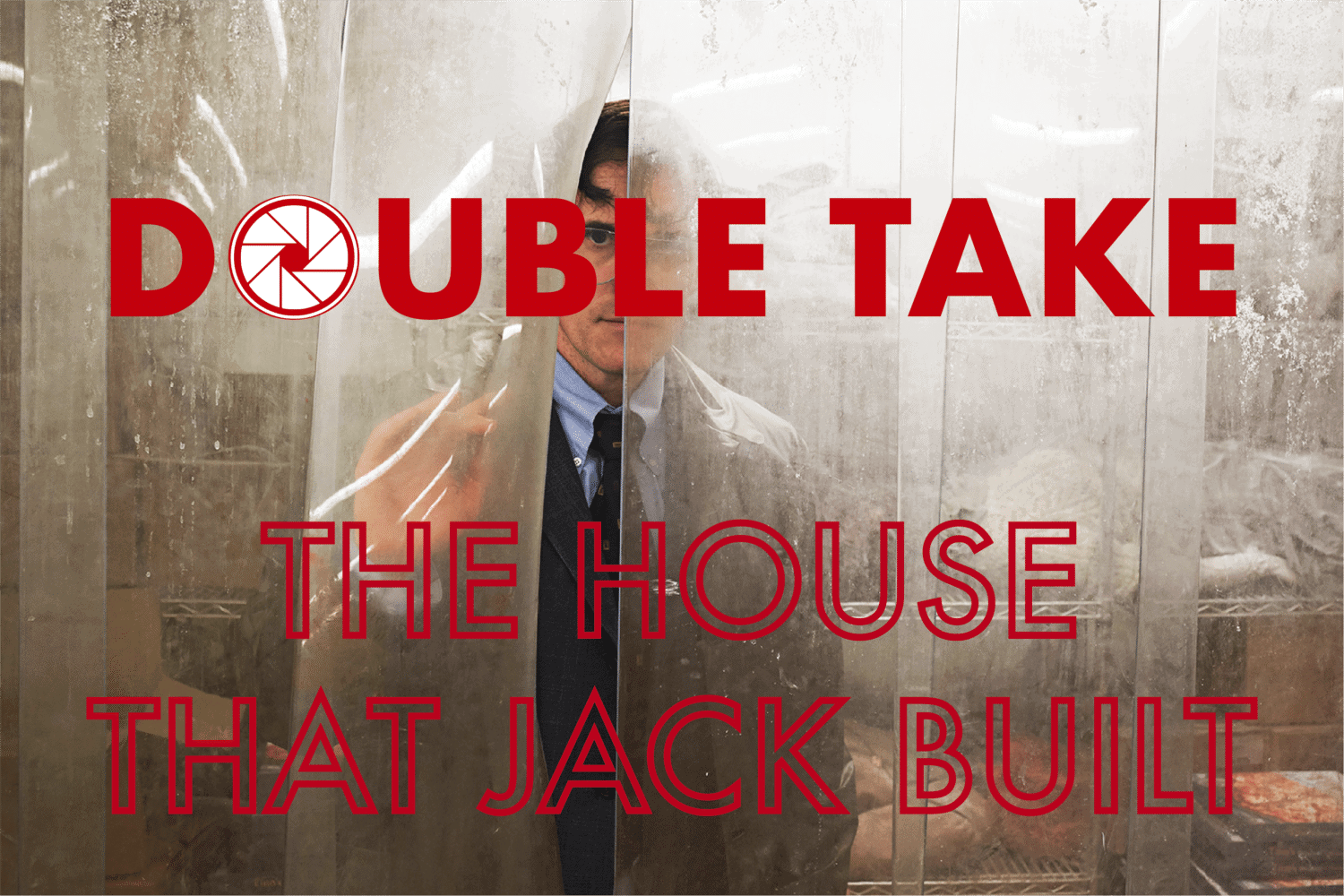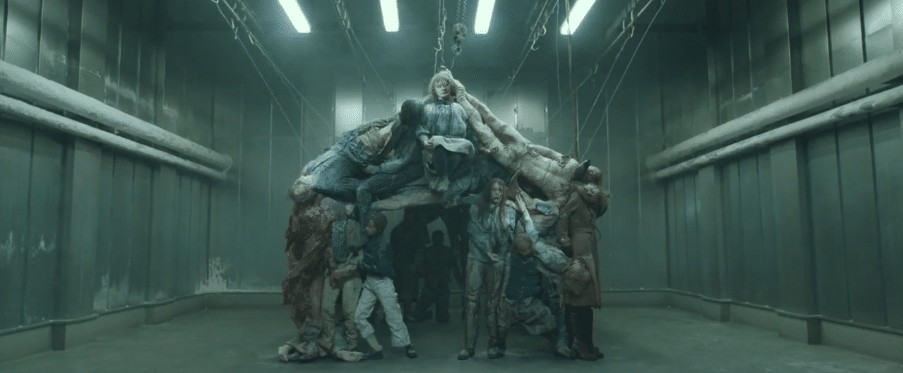
MS: Another example of Verge stepping in to be like, “you think you’re really hot shit, don’t you?” is the moment where Jack gives the example of his shadow passing under streetlights as a metaphor for why he kills. It’s presented in this assertive way, and then Verge is basically like, “you think you’re very deep but you’re actually just using transferable rhetoric to justify what you already believe!”
AS: I also want to talk about the film’s use of humor. I think it’s very productive the way the film has scenes that don’t alternate between horror and comedy. Because it’s all one and the same comedy never undercuts the horror of it. If anything it makes you more disturbed. I mean, I’m generally pretty desensitized to violence in movies and Jack takes me back every time I watch it. And it’s funny. I think it uses that humor not to make it easier to watch but to make it harder.
MS: I would also argue that humor is another clue that Jack is not the be trusted because every joke is at his expense. It’s laughing at, not with, him. There are also so many good needle drops in this film. It’s my favorite end credit needle drop I think. Like, “Hit the road, Jack. Fuck you.” And the needle drops of Bowie’s “Fame” get funnier and more disturbing every time they happen. The first time it’s hilarious because you’ve just seen this man truly fuck up a crime. He’s a moron. And then “Fame” blasts. It’s so funny.
AS: I think it’s also getting at how being a serial killer is a road to fame. If Jack was real he would be famous. There would be true crime podcasts about him. There would be movies about him. Zac Efron would be playing him.
MS: Yikes that’s depressing.
AS: Maybe one way of thinking about the role of “The Artist” in this film is how Jack—a narrator we’re not supposed to agree with—tells us to look at the finished product of the artist: the finished house. I think what von Trier is calling attention to is the parts that go into it, everything that contributes to it. That it’s not as simple as just a finished product.
MS: And the house is so gross. It’s literally cobbled together out of his victims’ body parts.

AS: And he dies when he builds it. He can’t live in the house that he’s spent his whole life trying to build. The artist can’t only live in or through their works. I think von Trier really wants us to think about what that house is built out of and what the ramifications of that are.
MS: Whenever any character in a movie holds a camera, it’s so tempting to be like, “well that’s the director.” There is something to that. Jack has this camera and he talks about it in two ways. The first being that his obsessive-compulsive disorder goes away when he renegotiates it into an artistic need. I think when I hear that I get a little squirrely about von Trier being edgy. But maybe that’s avoided by how mockingly the film presents his “inspired pictures.” By no means do they justify the murders.
AS: Yeah. It’s on the nose and an extension of this idea of separating the art from the artist in the sense of not caring about what went into something and only caring about the final result.
MS: The second way he talks about photography is the demonic light of the negative. The fact that it’s the last shot of the film probably means I should know what that signifies but I have no idea.
AS: I think it’s interesting that the film starts on a black screen and ends on a white screen in that the white screen is Jack’s damnation. I love that he’s damned. He thinks he’s going to climb out of hell the same way he talked his way out of things in life. And with the negative image of light and dark, maybe this is where it can work to somewhat think of Jack as von Trier in the sense that both are thinking deeply about the power of light and dark. I think about von Trier maybe trying to find something valuable or productive in the worst things? In the blackest black of humanity, trying to find…
MS: An oak tree?
AS: Yeah. And it’s not about ignoring the dark, but maybe about getting into something deeply, getting to the source, and understanding it. Or trying to understand it.
MS: Do you think this a misogynistic film?
AS: Like, okay, so I’ve seen women talking about this film and saying they don’t want to see this because there’s enough violence against women in real life. I 100% think that’s a fair response, and I don’t fault anyone for thinking this movie isn’t for them, I’m never gonna try to convince someone that they need to see this film or that they should like it. But my thing is, if you’re going to watch a movie about violence against women, it should be a movie that is honest about what violence is and doesn’t pretend violence can ever be an easy pill to swallow.
MS: I completely agree. Just to wrap up, I have some little observations. I really like the use of the color red. I like how it shows up with the jack and the van in the first Incident. I couldn’t find it in the second Incident but I guess it’s the blood that he’s obsessing over. In the third, there are hunting hats. Also, I hate trophy hunting. There are so many things happening in that Incident, but I think the alignment of the psychopathy of trophy hunting and serial murder is great. I love the connection between the decorative displays of corpses and the way that manifests in big game hunting and Jack shooting photos of his victims and the way serial killers turn the bodies of their victims into trophies and objects. I think that’s a really salient metaphor.
AS: I think one of the great jokes of this film is that Jack says, while he is hunting children, that he is a gentleman because he follows the rules of hunting.
MS: (laughing) Yes! I also love a self-dunk von Trier makes in the fourth Incident when Jack is calling his girlfriend Simple and Jacqueline’s like, “I have a name.”
AS: Yeah in Antichrist it’s He and She.
MS: I love that Jacqueline is like: “actually I’m a person.”
AS: Yeah, I like that.
MS: I like that we don’t see Jack’s turn in the third Incident. We don’t really see the transition from family man to a serial killer.
AS: Yeah, because he’s always that. It’s not about him tricking people, it’s like, this is always who he is. We’re not interested in seeing his mask, it’s not about being impressed by how he fools us. We see the real person.
MS: If you want that go watch the Zac Efron movie.
The director’s cut is now available for purchase on Amazon.
Related Topics: Double Take, lars von trier, Opinions, the house that jack built

